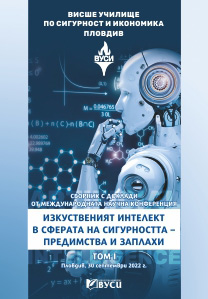Роля на образователните институции за бъдещото развитие на изкуствения интелект и устойчивото развитие на селската икономика
Role of educational institutions for future development of artificial intelligence and sustainable development of agricultural economy
Author(s): Marina Nikolova, Pavlin Bogomilov Pavlov
Subject(s): Economy, Education, Essay|Book Review |Scientific Life, Agriculture, State/Government and Education, Conference Report, ICT Information and Communications Technologies
Published by: Висше училище по сигурност и икономика (ВУСИ)
Keywords: artificial intelligence; educational institutions; digital agriculture sustainable development of the rural economy
Summary/Abstract: The development and implementation of artificial intelligence (AI) is largely determined by the development and potential of the anthropogenic factor. This means the availability of sufficient specialists, on the one hand, related to specific knowledge in the specific field, as well as skills for scientific research activity using appropriate methods and means to prove characteristics and trends. On the other hand, the implementation of the results in a practical environment and the teaching experience about the usefulness of introducing intelligent systems in a wider environment is also determined by human potential. Today, the „fourth industrial revolution“ in the agricultural sector is particularly important and necessary, i.e. digital agriculture to be the basis of the modern agrarian revolution in the Republic of Bulgaria. It is only through wide application of scientific achievements and innovations that it is possible to achieve quality results in agriculture. The modern economy today is characterized by the rapid entry of artificial intelligence AI, which is changing a number of economic sectors, including and agriculture and the rural economy, as territory. Society as a whole is facing sweeping transformations and a new technological revolution. In our country, AI as a key tool of development is entering more slowly, but more importantly, it is becoming a catalyst for the need for digital transformation.
- Page Range: 154-166
- Page Count: 13
- Publication Year: 2022
- Language: English, Bulgarian
- Content File-PDF

